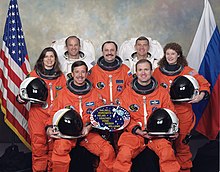 Williams outside Unity during the mission's sole EVA | |
| Names | Space Transportation System-101 |
|---|---|
| Mission type | ISS assembly/logistics |
| Operator | NASA |
| COSPAR ID | 2000-027A |
| SATCAT no. | 26368 |
| Mission duration | 9 days, 21 hours, 10 minutes, 10 seconds |
| Distance travelled | 6.6 million km (4.1 million mi) |
| Orbits completed | 155 |
| Spacecraft properties | |
| Spacecraft | Space Shuttle Atlantis |
| Landing mass | 100,369 kg (221,276 lb) |
| Payload mass | 1,801 kg (3,971 lb) |
| Crew | |
| Crew size | 7 |
| Members | |
| EVAs | 1 |
| EVA duration | 6 hours, 44 minutes |
| Start of mission | |
| Launch date | 19 May 2000, 10:11 UTC |
| Launch site | Kennedy, LC-39A |
| End of mission | |
| Landing date | 29 May 2000, 06:20 UTC |
| Landing site | Kennedy, SLF Runway 15 |
| Orbital parameters | |
| Reference system | Geocentric |
| Regime | Low Earth |
| Perigee altitude | 319 km (198 mi)[1] |
| Apogee altitude | 332 km (206 mi)[1] |
| Inclination | 51.5°[1] |
| Period | 91.04 minutes[1] |
| Epoch | 21 May 2000 |
| Docking with ISS | |
| Docking port | Unity forward (PMA-2) |
| Docking date | 21 May 2000, 04:31 UTC[2] |
| Undocking date | 26 May 2000, 23:03 UTC |
| Time docked | 5 days, 18 hours, 32 minutes |

 Standing, from left: Weber, Williams (in white), Usachov, Voss (in white) and Helms Seated: Halsell and Horowitz | |
STS-101 was a Space Shuttle mission to the International Space Station (ISS) flown by Space Shuttle Atlantis. The mission was a 10-day mission conducted between 19 May 2000 and 29 May 2000. The mission was designated 2A.2a and was a resupply mission to the International Space Station. STS-101 was delayed 3 times in April due to high winds. STS-101 traveled 4.1 million miles and completed 155 revolutions of the earth and landed on runway 15 at Kennedy Space Center. The mission was the first to be flown by a shuttle equipped with a glass cockpit.
- ^ a b c d McDowell, Jonathan. "Satellite Catalog". Jonathan's Space Page. Retrieved 6 May 2013.
- ^ Evans, Ben (20 May 2020). "A New Vehicle: Remembering Atlantis' STS-101 Mission, 20 Years On". Retrieved 24 May 2020.